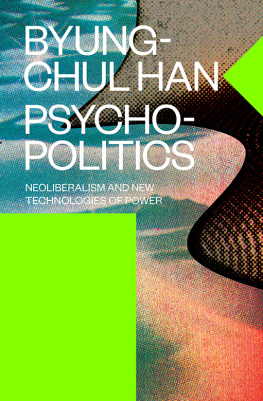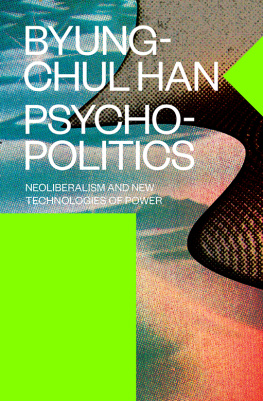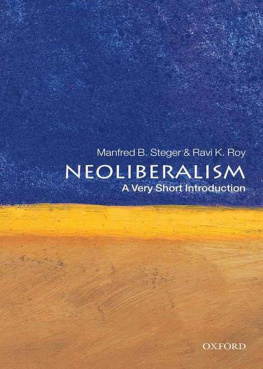
Late Escapism and Contemporary Neoliberalism
This book suggests that escapism the desire to leave ones physical or emotional circumstances for an ideal alternative is a way to understand the social conflicts that structure our world. Considering this phenomenon across psychology, labour and cultural studies, the author engages with critical theorists such as Lukcs, Fromm and Marcuse to examine how escapism appears in our minds, workplaces and utopian imaginaries from fiction to music. In this study, escapism emerges as a constitutive feature of the late capitalist lifeworld a feature that must be understood in order to create social change.
Defining escapism as a new field of study, Late Escapism and Contemporary Neoliberalism: Alienation, Work and Utopia suggests that the phenomenon has much to teach us about contemporary consciousness and how we resist and reshape the edicts of neoliberalism. As such, this book will appeal to scholars of cultural and critical theory, social movements and political sociology.
Greg Sharzer is Assistant Professor Teaching Stream in Centre for Teaching and Learning at the University of Toronto Scarborough, Canada, and author of No Local: Why Small-Scale Alternatives Wont Change The World.
First published 2022
by Routledge
2 Park Square, Milton Park, Abingdon, Oxon OX14 4RN
and by Routledge
605 Third Avenue, New York, NY 10158
Routledge is an imprint of the Taylor & Francis Group, an informa business
2022 Greg Sharzer
The right of Greg Sharzer to be identified as author of this work has been asserted by him in accordance with sections 77 and 78 of the Copyright, Designs and Patents Act 1988.
All rights reserved. No part of this book may be reprinted or reproduced or utilised in any form or by any electronic, mechanical, or other means, now known or hereafter invented, including photocopying and recording, or in any information storage or retrieval system, without permission in writing from the publishers.
Trademark notice: Product or corporate names may be trademarks or registered trademarks, and are used only for identification and explanation without intent to infringe.
British Library Cataloguing-in-Publication Data
A catalogue record for this book is available from the British Library
Library of Congress Cataloging-in-Publication Data
Names: Sharzer, Greg, author.
Title: Late escapism and contemporary neoliberalism : alienation, work and utopia / Greg Sharzer.
Description: Milton Park, Abingdon, Oxon ; New York, NY : Routledge, 2021. | Includes bibliographical references and index.
Identifiers: LCCN 2021003243 (print) | LCCN 2021003244 (ebook) | ISBN 9781138242319 (hardback) | ISBN 9781032040912 (paperback) | ISBN 9781315278735 (ebook)
Subjects: LCSH: Escape (Psychology) | Neoliberalism.
Classification: LCC BF575.E83 S53 2021 (print) | LCC BF575.E83 (ebook) | DDC 158--dc23
LC record available at https://lccn.loc.gov/2021003243
LC ebook record available at https://lccn.loc.gov/2021003244
ISBN: 9781138242319 (hbk)
ISBN: 9781032040912 (pbk)
ISBN: 9781315278735 (ebk)
DOI: 10.4324/9781315278735
Typeset in Times New Roman
by KnowledgeWorks Global Ltd.
For Hyangmi
Table of contents
- References
- Escapism and negative humanism
- Work and protective escapism
- Dystopias and utopias
- The uses of escapism
- Half Title
- Contents
- References
- 2 Escapism and negative humanism
- 3 Work and protective escapism
- 4 Dystopias and utopias
- 5 The uses of escapism
Foreword
When I was 21, I had a summer job in a small factory making plastic sports equipment, such as hockey sticks, ping pong bats and badminton racquets. Every day, I fed plastic tubes into a stamping machine that would cut them into a wedge shape, onto which I would fit a plastic hockey blade. Or I would wipe toxic glue onto ping pong bats before pressing rubber pads onto them. The monotony was oppressive, I poured easily-flammable toluene into plastic cups with no protective gear, the average wage was $12 an hour, and my racialized co-workers divided themselves into a hierarchy of skin colour, from light to dark, making the latter bear the brunt of racist jokes. As a self-described radical, I considered myself to be among the vanguard of super-exploited workers who were suffering from false consciousness. But where was the socialist fraternity I read, debated and marched about? On the bus to work I read State Capitalism in Russia, the seminal work on the rise of a new Soviet ruling class, but surprisingly, very few opportunities arose to talk about the Stalinist inflation of digger production. The days dragged on, and when I got home from work I was too tired to do anything but watch Jean-Luc Picard lead the starship Enterprise through its continuing mission, on which I noticed that almost no one was racist or exploited. My fellow activists were effusive on strikes in France and how to fight the Nazis in Lewisham in 1977, but had very little concrete advice on how to deal with a toxic work environment.
That environment was largely due to the boss, Vince (all names changed), who yelled at people for making mistakes, or for possibly making mistakes in the future. His outbursts were so over-the-top that, as a creative writing student, I began writing them down for inspiration. So, for example, when Vince wanted to motivate the workforce before assigning a big order, he would call whoever was on the shop floor over to one of the grey-green presses and tell us, I was nice before, but now Im not taking any more shit. You cant possibly understand the problems I have. I have very little faith that you guys can do this. Prove me wrong. He had an undergraduate degree in business administration and fancied himself a leader, so every word in the last phrase was drawn out and emphasized, as if proving him wrong was a vital task. One time he threatened to pull my fingernails out if I made a mistake. It was just banter, of course.
I became friendly with Gus, my foreman, an Iranian guy with two kids who earned his $14 an hour a whole $2 wage premium above myself, the temporary summer help by being the object of the bosss daily tirades. He was an immigrant with two kids to support and, I discovered to my joy, a socialist who had a fine arts degree. One day we were discussing guardedly how irrational the workplace was, and he told me, You may think that when you graduate, working life will be different for you; well, its all like this. And then: You can get through this because you can think, Tomorrow, Ill be gone. Me, I have to live with the fact that Im here tomorrow, the next day, next week, next year. And he would look back down at his work. When I told Vince I was going back to school at the end of August, he was genuinely surprised. He wanted me to come back on weekends, because I had a steady hand and could stamp the company logo onto plastic tennis balls without smearing it. I demurred.
When I was 28, I worked as a secretary in a large public institution. I figured out that although the work was relatively easy and my boss was not unkind, there was no future in it. I decided to collect my savings, up stakes and travel. I told a supervisor, a handsome, charismatic man in his 40s universally seen as the workplace comedian. He lost his smile and said, I would love to travel but I cant go anywhere. Thats why I eat. The implied to excess after those words was not visible.









